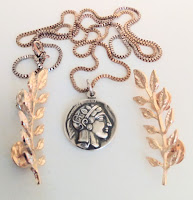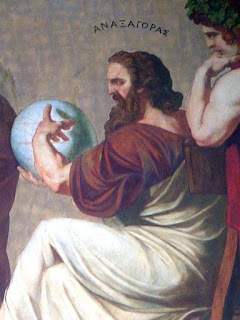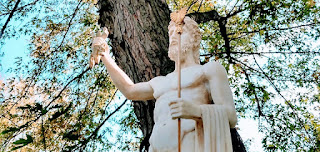Wednesday, April 17, 2024
Ancient Greek Art of Happiness That May Surprise You
Monday, February 5, 2024
Do We Still Love Athletes Like Ancients?
Thursday, December 28, 2023
Tomb of Cerberus Set To Be 2023 Gem
Tuesday, December 19, 2023
Life's Altar Blocks Are Always Drenched In Blood
Sunday, July 30, 2023
How A Hellenic Marriage Endured The Impossible
Friday, July 7, 2023
Difference Between A Sacrifice and An Offering
A sacrifice is normally something of exceptional cost or worth to you, that you give up to the Gods, and in so doing, make sacred.
In ancient Greek times, this would have encompassed livestock a lot, because they met the above criteria. Giving up sheep, goats, and cattle was, or could be, very costly to the livelihood of the average person.
Yet that willingness to still risk the loss in order to show love, admiration, and request favor from, the Gods, is what made it a sacrifice and a sacred act. The willingness to go long was believed to have grabbed the Gods' attention more.
Today, of course, it doesn't have to pertain to livestock because most people don't live that kind of life anymore. Now our costly sacrifices would be things like money, valuable properties, and our physical time and labor. Even large portions of food and drink, things that take a lot of effort to put together, would be sacrificial.
An offering, however, is a general gift, such as a votive statue, libation, a valuable, or some appropriate foods. They are things that are more readily available and not as costly; easy for pretty much anyone to obtain.
If I give a fresh bar of soap to Aphrodite for Her baths, a libation of olive oil for Athena, or burn incense to Zeus, those would be offerings. This is a bit contradictory to me, because I have normally called all of my burned offerings sacrifices, but to be more accurate, I should use the term offering: my burned offering.
Then again, if it were a huge portion of incense, it may be able to be called sacrifice, but that would take an almost comical pile. Not something normally done.
Often these days, I find myself paying more attention to how I term things, especially publicly. In many cases, I felt the term offering had been used in the religious communities almost to the point of being cliche or monotonous, so I didn't really like using it a lot.
But as a Reconstructionist Hellenist, I find myself more and more concerned with historical accuracy and appropriate piety on a regular basis. It's a lifelong learning experience. Do I think the Gods are petty and care about which term you use? Absolutely not. But the properness sets the human mind correctly.
In the Goodness of the Gods, I'll see you at the next Herm down the road,
Chris Aldridge.
Wednesday, July 5, 2023
In Another Solar System, Would I Still Call Him Helios?
Sunday, July 2, 2023
Pendants From Greece Hold More Natural Power
Tuesday, June 13, 2023
Mythology/Theology: To The Greeks, There Was A Difference
The first mistake modern people make is thinking all religions are the same, and thus, they assume that the ancient Greeks had a "holy book" of religion and myth. This is utterly false.
Not only was ancient Greece a collection of City States completely independent from one another in government and beliefs, but there was no law dictating how someone could view the Gods or what stories they could accept or not.
In fact, it's kind of inaccurate to call it "The Ancient Greek Religion" because there were, in fact, many forms of ancient Greek religion and Cult. Sparta and Athens, for example, believed in the same Gods but did not have the same religion or culture. Not to mention the fact that there were cults everywhere that adhered to their own identities.
So for instance, someone today might say that my beliefs on Artemis being gracious and kind to people is skewed considering the myth of Actaeon, but there's literally nothing in Hellenic religion which says I have to accept that story as literal fact or accept it at all. It's not like Christianity or Islam where the title of the religion depends on the acceptance of one written book or "testament."
We do know that we believe in Artemis as She is, of course. But I don't have to believe everything that everyone tells me about Her. I have the right to my own experiences and perspectives, and it does not denote me as a Hellenist.
You can believe whatever you want about someone, but it doesn't change them. You can believe that Chris Aldridge is a shapeshifting, blood drinking vampire, but it does not make me one, nor does it make me guilty of said actions.
It's also true that not only could a given myth vary in detail from City to City, but many of them were handed down by word of mouth, which can change and modify with each teller, especially as the time and culture changes.
In fact, some of the myths we accept today as Greek, were not even composed by the Greeks. The story of raped Medusa that people commonly call Greek in our time, was actually written by a Roman. The original story, which says nothing of rape or punishment, was written by the Greek Hesiod.
This is also not a modern change to Hellenism either. Greeks were not forced to accept a given story. Historically, it's accepted that around the time of the Hellenistic Era, the myths as literal facts began to waiver as a concept.
But considering people like Plato and Sokrates, I think it began much sooner than that. Those men clearly believed in the Greek Gods but were also philosophers and not necessarily mythologists. They wrote about people's experiences with the Gods instead of taking written myths and saying, "Here's the 100% truth."
Hellenic religion can be hard to understand, but if you ever manage to grasp the core, it'll make perfect sense to you.
In the Goodness of the Gods, I'll see you at the next Herm down the road.
Chris Aldridge.
Thursday, June 1, 2023
What If Mount Olympos Is The Unknowable Center?
Thursday, May 18, 2023
Have City Loyalty; Your Greek Ancestors Would Be Proud
Monday, May 15, 2023
The Riace Bronzes: A Hellenist On The Unsolved Mystery
Monday, April 24, 2023
When The Soothsayer Showed Up The Scientist
*Literary- Aird, Hamish, Pericles, The Rise and Fall of Athenian Democracy, The Rosen Publishing Group, New York, New York, 2004, pp. 24-25.

















